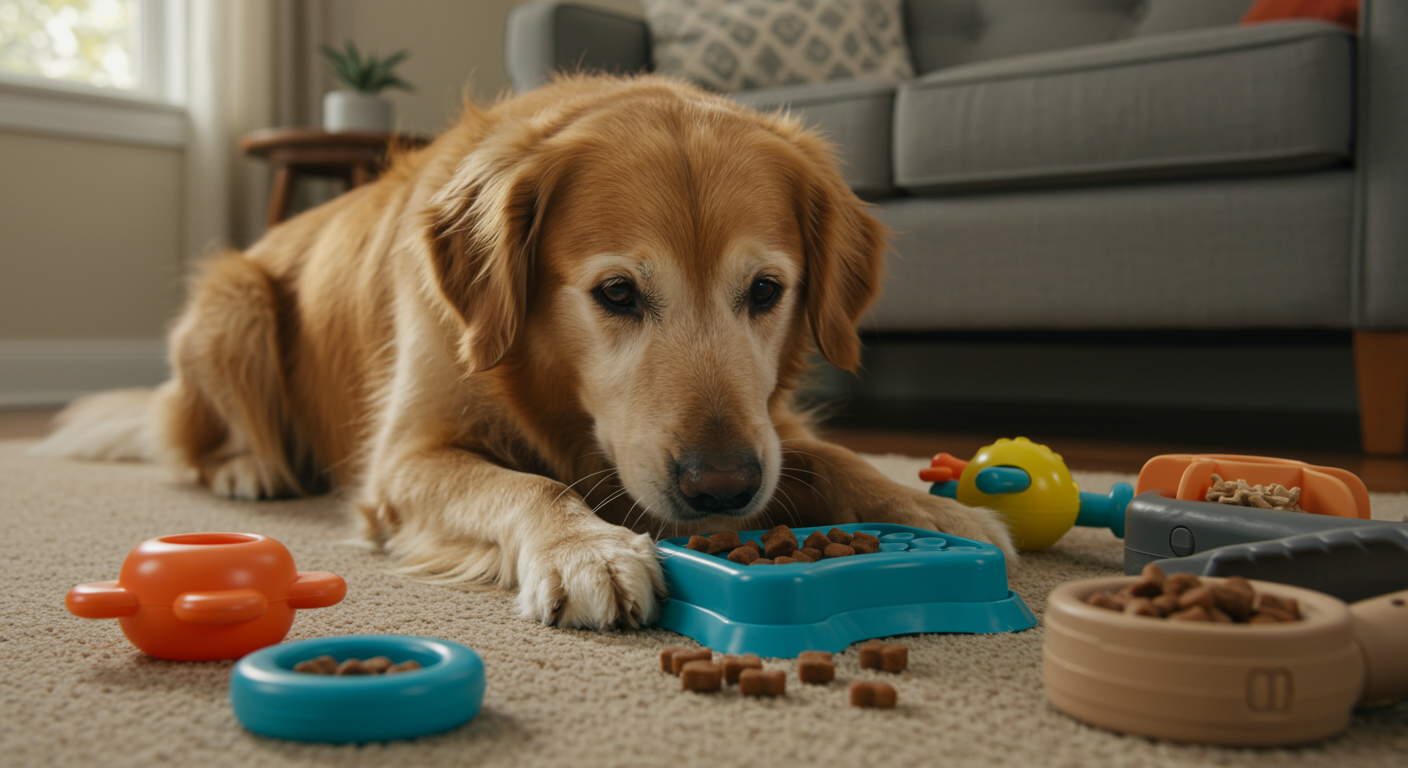Mental stimulation becomes increasingly important for senior Golden Retrievers as physical activity naturally decreases with age, making cognitive engagement essential for maintaining psychological well-being, preventing boredom, and supporting overall quality of life. Senior dogs possess years of experience and retained intelligence that can be channeled into appropriate mental enrichment activities.
Understanding that mental exercise can be just as tiring and fulfilling as physical exercise helps families provide comprehensive wellness support for their aging Golden Retrievers. Cognitive engagement helps maintain mental sharpness, provides purposeful activity, and creates positive experiences that enhance daily life satisfaction.
Mental enrichment activities for senior dogs should be adapted to accommodate potential vision, hearing, or mobility changes while still providing meaningful challenges and engagement. The goal is to create stimulating experiences that celebrate the dog’s intelligence while respecting their changing capabilities and energy levels.
Understanding Senior Cognitive Needs
Brain Health and Mental Stimulation
Cognitive Function Maintenance
Regular mental stimulation helps maintain cognitive function in senior Golden Retrievers by encouraging neural pathway usage and promoting continued learning and problem-solving abilities throughout the aging process.
Mental exercises can help slow cognitive decline by keeping the brain active and engaged, similar to how physical exercise helps maintain muscle tone and joint mobility in aging bodies.
Understanding that mental stimulation is a use-it-or-lose-it proposition helps families prioritize cognitive enrichment as an essential component of comprehensive senior dog care.
Preventing Cognitive Boredom
Senior Golden Retrievers spending more time indoors or having reduced activity levels are at increased risk for cognitive boredom, which can lead to depression, anxiety, or destructive behaviors even in previously well-behaved dogs.
Mental enrichment activities provide purpose and engagement that help fill the time previously occupied by more active pursuits, maintaining psychological well-being during periods of reduced physical activity.
Creating varied mental challenges helps prevent habituation and maintains interest in cognitive activities over time, ensuring continued engagement and benefit from enrichment efforts.
Adapting Activities for Senior Capabilities
Vision and Hearing Considerations
Mental enrichment activities should be adapted to accommodate potential vision or hearing changes that may affect how senior Golden Retrievers interact with their environment and respond to traditional stimulation methods.
Activities that rely primarily on scent, touch, or taste may be more accessible for dogs with vision or hearing limitations while still providing meaningful mental engagement and challenge.
Understanding individual sensory capabilities helps guide activity selection and modification to ensure that mental enrichment remains accessible and enjoyable despite age-related changes.
Mobility and Energy Adaptations
Mental enrichment activities should require minimal physical exertion while maximizing cognitive engagement, making them ideal for senior dogs with mobility limitations or reduced energy levels.
Stationary or low-movement activities can provide significant mental stimulation without placing stress on arthritic joints or requiring sustained physical effort that may be uncomfortable.
Creating activities that can be performed from comfortable positions helps ensure that all senior dogs can participate in mental enrichment regardless of their physical limitations.
Food-Based Mental Enrichment
Puzzle Feeding and Food Games
Interactive Feeding Devices
Food puzzles and interactive feeders transform mealtime into mental challenges that provide cognitive stimulation while slowing eating pace for better digestion and extended meal enjoyment.
Senior-appropriate puzzle feeders should be easy enough to solve to prevent frustration while still providing mental engagement and problem-solving opportunities that stimulate cognitive function.
Rotating different puzzle types prevents habituation while providing variety in feeding experiences that maintain interest and challenge over time.
DIY Food Enrichment Ideas
Simple homemade food puzzles using household items like cardboard boxes, toilet paper rolls, or muffin tins can provide cost-effective mental stimulation while allowing customization for individual capabilities and preferences.
Hiding treats in various locations around the house or yard creates scavenger hunt experiences that encourage gentle movement while providing mental stimulation through problem-solving and discovery.
These DIY approaches allow for easy modification and replacement, ensuring that activities remain fresh and engaging while accommodating changing needs and preferences.
Treat-Based Learning Games
Training Integration
Incorporating treat rewards into simple training exercises provides mental stimulation while reinforcing positive behaviors and maintaining communication pathways between senior dogs and their families.
Review and practice of previously learned commands helps maintain cognitive function while providing opportunities for success and positive reinforcement that boost confidence and engagement.
Learning new, simple tricks adapted for senior capabilities can provide mental challenge while creating positive interaction experiences and demonstrating continued learning ability.
Mental Enrichment Activities Guide
| Activity Type | Difficulty Level | Time Required | Materials Needed | Benefits | Senior Adaptations |
|---|---|---|---|---|---|
| Food Puzzles | Beginner to Intermediate | 10-20 minutes | Puzzle feeders, treats | Problem-solving, slower eating | Choose easier puzzles, larger pieces |
| Scent Games | Beginner | 5-15 minutes | Treats, hiding spots | Natural instinct use, gentle movement | Use stronger scents, obvious hiding spots |
| Training Review | Beginner | 5-10 minutes | Treats, patience | Mental exercise, bonding | Shorter sessions, celebrate small wins |
| Exploration Games | Beginner to Intermediate | 15-30 minutes | New environments or objects | Curiosity satisfaction, sensory stimulation | Ensure safety, allow extra time |
| Interactive Toys | Intermediate | 10-25 minutes | Puzzle toys, supervision | Independent problem-solving | Choose appropriate difficulty levels |
| Memory Games | Intermediate | 10-15 minutes | Treats, containers | Cognitive challenge, memory exercise | Use fewer options, clear distinctions |
Sensory-Based Enrichment Activities
Scent Work and Nose Games
Natural Scenting Abilities
Golden Retrievers retain their excellent scenting abilities well into their senior years, making scent-based activities ideal for mental enrichment that utilizes natural instincts and capabilities.
Simple scent games such as hiding treats around the house or yard provide mental stimulation while encouraging gentle movement and natural foraging behaviors that many dogs find deeply satisfying.
Creating scent trails using treats or favorite toys can provide extended mental engagement while allowing dogs to work at their own pace and comfort level.
Structured Scent Activities
More structured scent work activities such as identifying specific scents or finding hidden objects can provide advanced mental challenges for senior dogs who enjoy problem-solving activities.
Using essential oils safe for dogs or distinctive food scents can create scent discrimination games that challenge cognitive abilities while providing engaging and rewarding experiences.
These activities can be performed indoors or outdoors and adapted for different weather conditions, ensuring year-round availability of engaging mental enrichment opportunities.
Tactile and Exploration Activities
Texture Exploration
Providing various safe textures for exploration such as different fabrics, surfaces, or materials can stimulate curiosity and provide sensory enrichment for senior dogs.
Texture boxes or exploration areas with different materials allow dogs to investigate and choose preferred textures while providing novel sensory experiences that stimulate mental engagement.
Understanding individual preferences for different textures helps guide activity design while ensuring that exploration remains pleasant and engaging rather than stressful or overwhelming.
Environmental Enrichment
Rotating toys, rearranging furniture, or introducing new safe objects for investigation can provide environmental enrichment that stimulates curiosity and mental engagement without requiring physical exertion.
Creating exploration opportunities within the familiar home environment provides safe adventure that accommodates mobility limitations while still offering novel experiences and mental stimulation.
These environmental changes should be introduced gradually to prevent anxiety while still providing enough novelty to stimulate interest and cognitive engagement.
Social and Interactive Mental Activities
Family-Involved Enrichment
Training Games with Family Members
Simple training games involving multiple family members can provide social stimulation while maintaining cognitive engagement through learning and communication with different people.
Activities such as “find the person” games or simple command following with different family members provide mental stimulation while reinforcing family bonds and social connections.
These social activities help maintain the dog’s role within the family structure while providing mental engagement through interaction and communication with loved ones.
Visitor Interaction Activities
When appropriate for the individual dog’s comfort level, gentle interactions with familiar visitors can provide social and mental stimulation through exposure to different people and social situations.
Structured visitor activities such as simple trick demonstrations or treat giving can provide positive social experiences while maintaining mental engagement through interaction and performance.
Understanding the dog’s social comfort level helps ensure that visitor interactions remain positive and enriching rather than stressful or overwhelming for senior dogs.
Multi-Dog Enrichment
Appropriate Social Play
Senior Golden Retrievers living with other dogs may benefit from gentle, supervised social activities that provide mental stimulation through interaction while respecting physical limitations.
Simple games or activities that encourage gentle interaction without vigorous physical play can provide social enrichment while maintaining safety and comfort for all participating dogs.
Understanding pack dynamics and individual comfort levels helps guide social enrichment activities that enhance rather than stress relationships within multi-dog households.
Creative and Problem-Solving Activities
Puzzle and Problem-Solving Games
Cognitive Challenges
Simple problem-solving activities such as treat-dispensing toys or puzzle games provide mental challenges that stimulate cognitive function while providing rewarding experiences through successful completion.
Adjusting difficulty levels to match individual capabilities ensures that activities remain challenging enough to be engaging while being solvable enough to prevent frustration and maintain confidence.
Progressive difficulty increases can help maintain interest over time while continuing to provide appropriate cognitive challenges as dogs become familiar with basic problem-solving concepts.
Memory and Recognition Games
Memory games using familiar objects or people can provide cognitive exercise while celebrating retained abilities and knowledge that senior dogs have accumulated over their lifetimes.
Recognition activities that acknowledge the dog’s ability to identify family members, favorite toys, or familiar commands help maintain cognitive pathways while providing positive reinforcement.
These activities demonstrate respect for the dog’s intelligence and experience while providing opportunities for success and cognitive engagement.
Creative Exploration Activities
Art and Creativity Projects
Simple, safe art projects such as paw print making or supervised “painting” activities can provide novel experiences while creating lasting memories and keepsakes for families.
These creative activities should prioritize safety and comfort while providing unique sensory experiences that stimulate curiosity and engagement in new ways.
Understanding that the process is more important than the product helps focus on the enrichment value while creating positive experiences for both dogs and families.
Seasonal and Weather-Appropriate Activities
Indoor Mental Enrichment
Weather-Independent Activities
Indoor mental enrichment activities ensure consistent cognitive stimulation regardless of weather conditions that might limit outdoor activities for senior dogs.
Creating indoor scavenger hunts, puzzle games, or exploration activities provides mental engagement during periods when outdoor access is limited by weather or other factors.
These indoor alternatives should be just as engaging and rewarding as outdoor activities while accommodating space limitations and indoor safety considerations.
Seasonal Adaptation Strategies
Temperature-Appropriate Activities
Different seasons provide unique opportunities for mental enrichment that take advantage of weather conditions suitable for senior dog comfort and engagement.
Winter activities might focus on indoor enrichment with occasional short outdoor exploration, while milder seasons could emphasize longer outdoor scent work or exploration activities.
Understanding seasonal limitations and opportunities helps maintain year-round mental enrichment while prioritizing comfort and safety in activity selection and timing.
Monitoring and Adjusting Mental Enrichment
Activity Assessment and Modification
Engagement Level Monitoring
Regular assessment of the dog’s interest and engagement in mental enrichment activities helps identify which activities are most beneficial and enjoyable while revealing when modifications might be needed.
Understanding signs of appropriate challenge level versus frustration or boredom helps guide activity selection and difficulty adjustment to maintain optimal mental stimulation.
Tracking preferences and responses over time provides valuable information for continuing to provide effective mental enrichment as the dog’s needs and capabilities continue to evolve.
Long-Term Enrichment Planning
Sustainable Activity Programs
Developing sustainable mental enrichment routines that can be maintained consistently helps ensure long-term cognitive health benefits while preventing enrichment gaps that might affect mental well-being.
Understanding family capabilities and time constraints helps create realistic enrichment programs that can be maintained over time without causing stress for caregivers or dogs.
Creating backup activity options ensures that mental enrichment can continue even when primary activities aren’t available due to health changes, weather, or other circumstances.
Health Benefits and Quality of Life Enhancement
Cognitive Health Support
Mental Exercise Benefits
Regular mental enrichment provides cognitive exercise that can help maintain mental sharpness and potentially slow cognitive decline associated with aging in senior Golden Retrievers.
Understanding that mental stimulation can be as beneficial as physical exercise helps families prioritize cognitive enrichment as an essential component of comprehensive senior care.
These cognitive benefits contribute to overall quality of life by maintaining mental engagement and purpose during periods when physical activity may be naturally decreasing.
Emotional Well-Being Enhancement
Purpose and Accomplishment
Mental enrichment activities provide senior dogs with continued opportunities for accomplishment and success, helping maintain confidence and self-esteem during periods of physical change.
Understanding that mental challenges provide purpose and meaning helps families appreciate the emotional benefits of cognitive enrichment beyond simple entertainment value.
These psychological benefits contribute significantly to overall happiness and life satisfaction for senior Golden Retrievers navigating the challenges and changes of aging.
Mental enrichment activities for senior Golden Retrievers provide essential cognitive stimulation that supports brain health, prevents boredom, and enhances quality of life during the golden years. Through creative adaptation of activities to accommodate changing capabilities, families can help their senior dogs maintain mental sharpness and engagement throughout the aging process.
Success in providing mental enrichment comes from understanding that cognitive exercise is just as important as physical exercise for senior dogs, requiring consistent attention and creative adaptation to remain effective and engaging over time. With thoughtful planning and implementation, mental enrichment activities can significantly contribute to the happiness and well-being of senior Golden Retrievers.
The investment in mental enrichment pays dividends in improved cognitive function, enhanced daily satisfaction, and continued engagement with life that helps senior Golden Retrievers maintain their intelligence and curiosity throughout their golden years while providing meaningful activities that celebrate their continued learning abilities.





Comments
Pingback: How to Correct Aggressive Behavior in Dogs
Pingback: Everyday Joys With My Senior Golden
Pingback: Senior Golden Retriever Energy Levels: What’s Normal Over the Years
Pingback: Gentle Daily Activities to Support Senior Golden Retrievers’ Well-Being